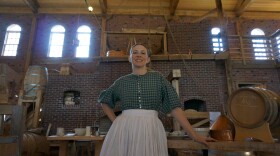A good cup of coffee in the morning and a local craft brew at night are just a couple of life’s simple pleasures many of us enjoy. Over the past decade or so, more and more people in the US are waking up to the quality differences between the drinks we, and our parents grew up with and those produced by real artisans. Perhaps as important as those drinks are the gathering spaces they’ve provided. Many towns now have cafes and microbreweries where locals gather to chat and listen to music or see art exhibits while sampling beverages.
There's a potential cloud on the horizon for this promising new movement. I thought about this during a recent trip to Guatemala with students. It’s a country where some of the world’s best coffee is grown. Over thousands of years, our agricultural practices have developed under fairly constant conditions. Let me remind everyone that constant climate certainly doesn’t mean predictable stable weather, as any farmer could tell us. Climate change is starting to disrupt some of the weather patterns we are used to, and these disruptions will increasingly affect not only our luxury crops, but staples as well.
Coffee is grown mainly in a handful of countries and the best coffee variety, Arabica, is mostly grown at relatively high altitudes and in areas with well-defined rainy and dry seasons, such as Guatemala or Ethiopia. In a warming climate, crops either do poorly, or the farmers must move further up the mountain to maintain the proper temperatures. And moving an entire farm isn’t exactly easy. Farmers can also switch to another variety, Robusta, which, as its name suggests, is somewhat hardier, but also tends to be of lower quality. And while that means more choices for us, it can be a problem for farmers who are living on the edge and cannot afford additional setbacks beyond the already unstable world market prices.
But there are other effects. A fungal disease in Guatemala called roya already harms plants, especially at lower altitudes. As the climate becomes milder, this disease can also work its way up the mountains to attack healthy plants. A change in climate may mean different rain patterns as well.
As for beer and its two main ingredients of barley and hops both are subject to the same uncertainties in a changing climate as those facing all farmers. Most beer ingredients are grown in wealthier countries, so it’s easier to adapt. Even if the direct impacts on crops can be held in check, there are worries that water shortages, either due to changing climate patterns or over-exploitation of ground-water sources could hamper breweries in some parts of the country.
Ironically, the major threats to beer might come from another direction all together. Precisely because of the need to move away from fossil fuels, many countries are turning to biofuels as an alternative. The problem is that arable land is limited. And the lucrative (for some, at least) possibility of replacing other food crops with biofuel crops exerts pressure on developing new strains of climate-change-resistant barley and hops. From another side, the threat is due to the potential for contamination of water sources due to the drilling processes connected with hydraulic fracturing. It was this fear that led breweries in the southern German region of Bavaria to protest against plans for fracking there.
As always with warnings about the effects of climate change, there are two important points to make. First, we are only starting to feel the effects now, but we have time to alleviate worse changes coming in the future. And second, the choices are in our hands, or at least, in the hands of companies from whom we buy products and lawmakers we elect. Some breweries are getting together to create sustainability plans by reducing water usage and installing renewable energy sources to help run their operations. But of course, they can’t do it alone.
Bob Brecha is a professor of physics and renewable and clean energy. He is the coordinator of the Sustainability, Energy and The Environment program at the University of Dayton.





